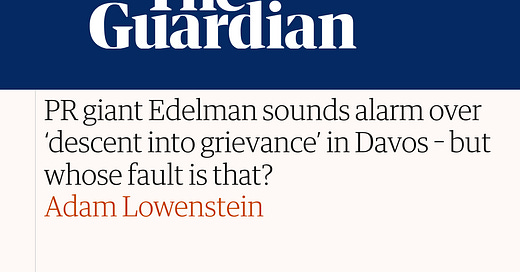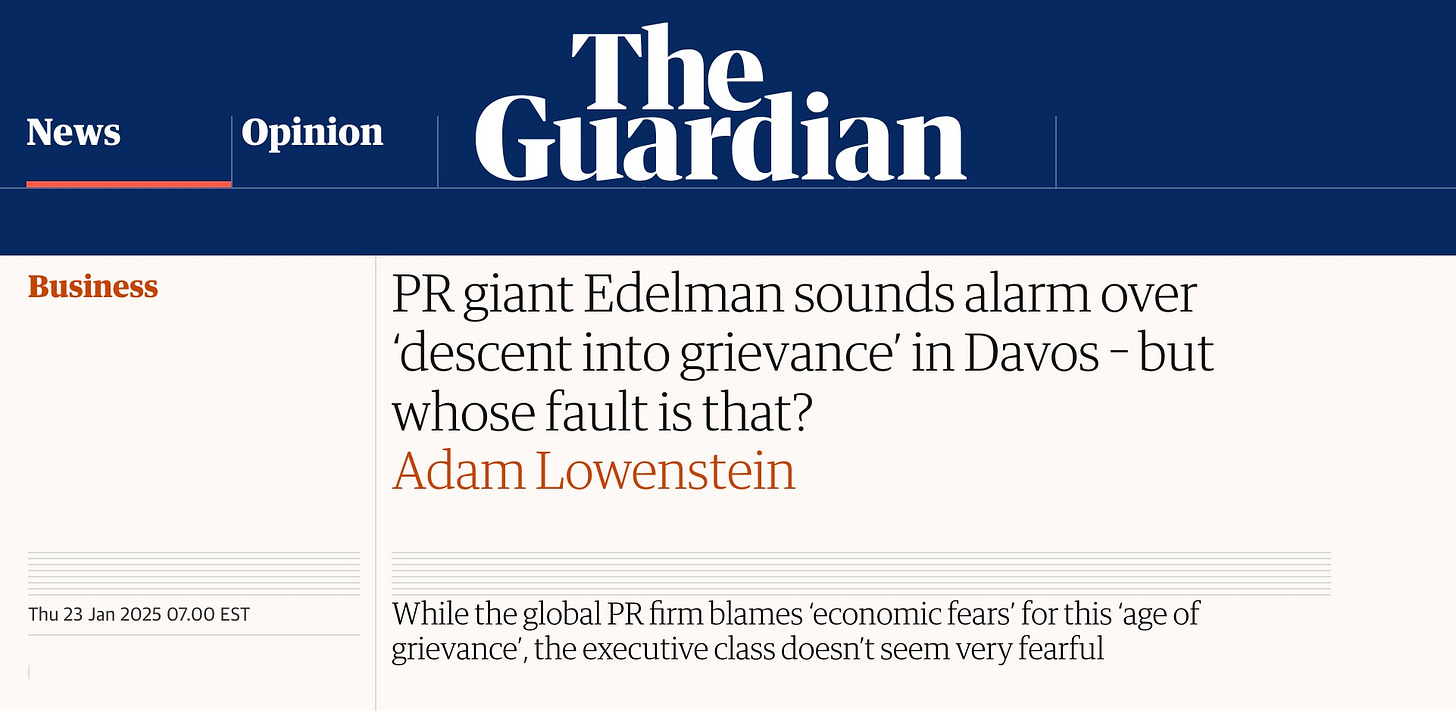Yesterday The Guardian published my latest article: “PR giant Edelman sounds alarm over ‘descent into grievance’ in Davos—but whose fault is that?”
In its “trust barometer” released earlier this week, Edelman prescribed “economic optimism” as the antidote to society’s “age of grievance.” My story offers an alternative take on the firm’s annual trust survey:
Edelman promotes this exercise as an objective gauge of public trust. A foundational tenet of the survey—and the advice Edelman derives from it—is that it measures whether people trust elite institutions and those who lead them.
But the barometer might be similarly revealing in reverse: as a reflection of what corporate and political elites think of ordinary people.
Richard Edelman, the company’s chief executive, disagrees with that assessment—and in the story, he explains why.
That’s one way in which this article differs from my previous reporting on the trust barometer: I was able to put some questions directly to the CEO. (It was a busy week for Richard Edelman and his team, and I appreciate his willingness to speak with me.)1
The article concludes on an unexpectedly hopeful note—unexpected, at least, when you consider some of the other messages that emerged from the World Economic Forum in Davos, Switzerland, this week:
[Richard] Edelman disputed the suggestion that his firm’s remedies for these grievances could be intended simply to convince people that things aren’t as bad as they think. “I really want to challenge that,” he said, insisting that “this is not some head-fake in a basketball game.”
The CEO pointed to what he called “a real problem of lack of facts—agreed facts.”
“We don’t have a good information system,” he said. “We have a ‘mass-class divide.’ We have a sense that the political system doesn’t work. Questions about capitalism. So we’ve pointed out all those things … our truth to the Davos crowd.”
Speaking truth to the Davos crowd matters. But Edelman is among this crowd’s higher-profile members. His PR agency depends on persuading clients—some of whom are also part of this very crowd—that Edelman can persuade people to trust them.
The Davos crowd benefits disproportionately from economic and political systems that many ordinary people have rightly concluded are not for them. And the Davos crowd has a disproportionate say over whether solutions to this conclusion advance beyond optimistic promises that carefully avoid interrogating who has power in society and who does not.
The “global leaders and changemakers” passing through Edelman Trust House this week might find it unsettling to consider their own culpability in this “grievance-based society.”
For everyone else, however, the unease on the slopes in Davos this week is an invigorating reminder that people—even those without a World Economic Forum badge—still have power. That’s a reason to be optimistic.
You can read the full article here: “PR giant Edelman sounds alarm over ‘descent into grievance’ in Davos—but whose fault is that?” My thanks, as always, to the great team at The Guardian.
Some of these past stories include: https://www.levernews.com/how-fossil-fuels-found-their-influencers; https://www.theguardian.com/us-news/2023/nov/24/edelman-pr-trust-barometer-uae-saudi-arabia; https://www.theguardian.com/business/2023/jan/15/edelman-pr-firm-davos-trust




